Global Microcomputer Equipment Market - Comprehensive Data-Driven Market Analysis & Strategic Outlook
The global microcomputer equipment market is shifting into an era where its scope will go beyond conventional computing uses and into sectors that will change the way industries and consumers engage with technology. This market will not just provide devices for typical computational functions but will also develop systems that interface with artificial intelligence, high-level automation, and virtual reality. With microcomputers growing smaller, more energy-efficient, and more powerful, they will extend the limits of accessibility and personalization, providing solutions previously deemed distant possibilities.
Will microcomputers maintain to redefine affordability in computing, or will advancing technologies like smartphones and tablets overshadow their relevance, and how might emerging markets and IoT integration open new pathways for growth whilst posing fresh uncertainties?
- Global microcomputer equipment market valued at approximately USD 68.7 billion in 2025, growing at a CAGR of around 6.0% through 2032, with potential to exceed USD 103.3 billion.
- Network Computer account for nearly 18.1% market revenues, driving innovation and expanding applications through intense research.
- Key trends driving growth: Proliferation of IoT devices and edge computing applications., Demand for compact, energy-efficient computing solutions.
- Opportunities include Growth in customized SBCs (Single-Board Computers) for niche applications.
- Key insight: The market is set to grow exponentially in value over the next decade, highlighting significant growth opportunities.
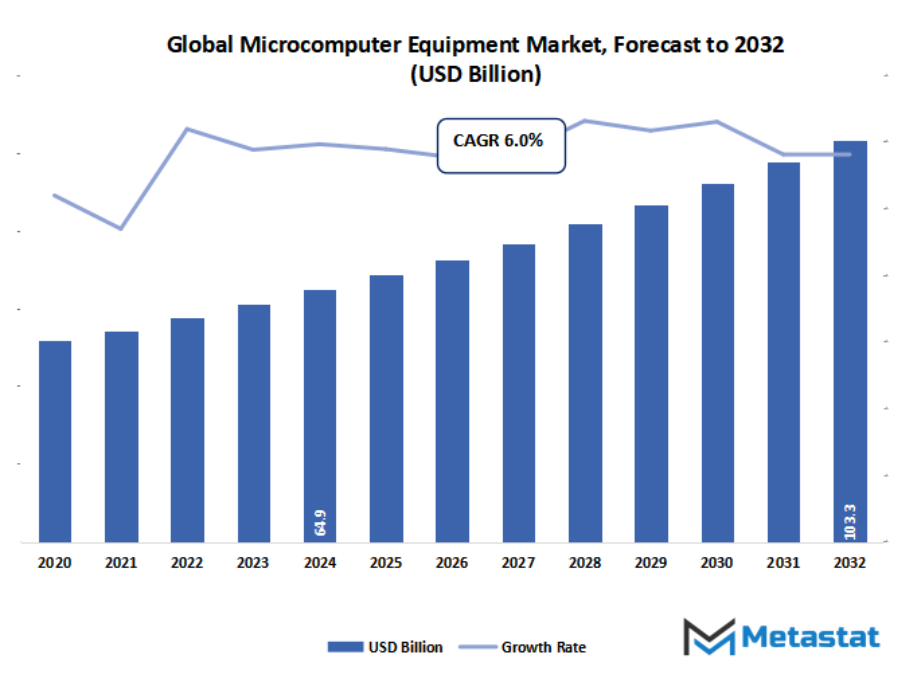
The industry will witness in the future microcomputers acting as the core infrastructure for developments in healthcare, education, and communications. Machines will be designed to enable sophisticated diagnostics, virtual classrooms, and super connected societies, establishing an environment where machines coexist harmoniously with human requirements. Apart from business purposes, the market will also shape cultural and creative spaces, with microcomputers poised to be directly engaged in music creation, designing, and entertainment. Through the integration of high-level processing with portable forms, future systems will facilitate creativity without being bound by conventional configurations.
The growth of the global microcomputer equipment market will also include greater integration with sustainability objectives. Future product designs may be geared toward minimizing electronic waste and enhancing the lifespan of additives with using recyclable substances and modular enhancements. These practices will adjust the manner clients devour technology, shifting far from short-term comfort to lengthy-term flexibility.
Geographic Dynamics
The global microcomputer equipment market is encouraged by sizable geographic attain, with every vicinity contributing to its development and direction uniquely. North America has been one of the maximum dynamic regions, typically due to the provision of state-of-the-art era infrastructure and a sturdy consumer base. The United States dominates this place, observed through Canada and Mexico, wherein constant demand continues to force innovation and adoption. Since the U.S. Is home to numerous generation-intensive groups, the vicinity will preserve its position in the future years as well.
In Europe, the market is determined by nations like the UK, Germany, France, and Italy, along with the Rest of Europe. Germany is generally considered to be a trendsetter because of its emphasis on high-tech engineering and technological innovation, while the UK and France contribute by way of intense research and development. The Rest of Europe makes its contribution to the market by expanding demand in consumer and industrial uses. All these countries collectively form a good foundation which supports the widespread use of microcomputer hardware in a variety of sectors.
Asia-Pacific is one of the most dynamic regions in the market, with nations such as China, India, Japan, and South Korea driving growth at a fast pace. China and India boast huge populations that create demands for low-cost computing solutions, while Japan and South Korea are famous for their robust technology sectors and innovation. This region will continue to grow rapidly, considering the increasing digitalization and investment in contemporary infrastructure. The Rest of Asia-Pacific is also of potential as developing economies shift towards greater take-up of microcomputer systems.
The Middle East & Africa and South America also contribute significant value to the global market. Brazil and Argentina are the key drivers in South America, with the Rest of the region experiencing steady development. In the Middle East & Africa, GCC Countries, Egypt, and South Africa will likely experience increasing adoption as industries become more modernized and digital transformation takes hold. These regions will also likely be driven by rising investment in consumer and commercial technologies, making the global microcomputer equipment market a genuinely global arena of growth and innovation.
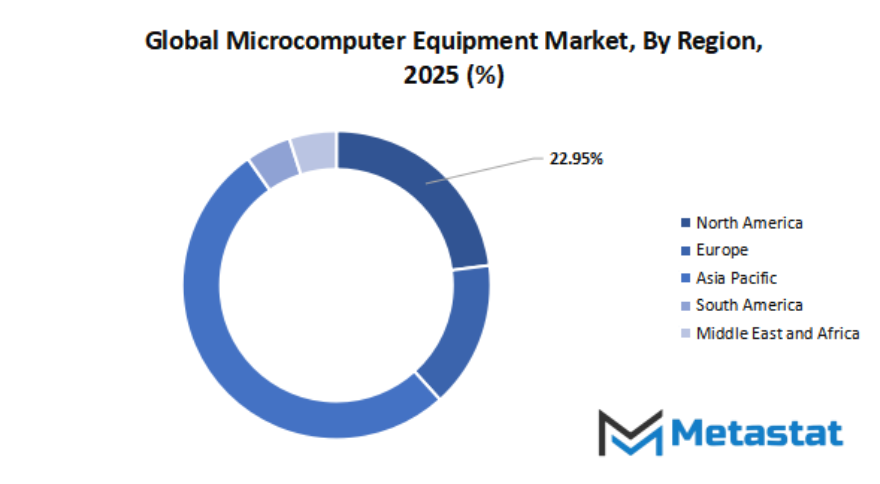
Market Segmentation Analysis
The global microcomputer equipment market is mainly classified based on Type, Application.
By Type is further segmented into:
- Network Computer - Network computer in the global microcomputer equipment market will keep increasing as connectivity is becoming a core need. Improved cloud computing, data collaboration, and far-off accessability will fuel the demand for effective networking devices. Next-generation designs will put emphasis on speed, security, and flexibility for enterprise solutions as well as personal users.
- Industrial Control Computer - Industrial control computer shall continue to be a robust pillar of the global microcomputer equipment market as manufacturing and automation grow. Future systems will be engineered to support higher workloads, better sensor integration, and predictive analytics. These computer shall lead industries into more intelligent operations where accuracy and minimized downtime are paramount.
- Personal Computer - Personal computer will remain crucial in the global microcomputer equipment market as digital engagement intensifies. As mobile technology advances, more need for robust personal systems will arise with professional and imaginative works. The future will witness lighter, quicker, and more energy-sipping personal computers that will fulfill every day and sophisticated needs.
- Embedded Computer - Embedded computer will dictate the global microcomputer equipment market as intelligent devices, IoT, and self-driven systems become more prevalent. These systems will transform to offer improved control in vehicles, healthcare, and home technology. Future development will focus on small form factor, dependability, and adaptability to growing connected environments.
By Application the market is divided into:
- Engineering Design - Engineering design will intensify the global microcomputer equipment market as businesses shift toward precision-based frameworks and sophisticated modeling. The future will witness high-performance systems being designed to manage intricate simulations, 3D modeling, and real-time analytics. Such systems will enable engineers to develop solutions that intensify sustainability, safety, and worldwide infrastructure.
- Animation Production - Animation production will drive the global microcomputer equipment market forward as entertainment and digital media grow. New systems will allow for accelerating rendering, high-resolution imagery, and immersive experiences. As virtual production and digital storytelling continue to grow, machines will be optimized to assist creative industries where quality and efficiency are the keys to success.
- Scientific Research - Scientific inquiry will require further innovation in the global microcomputer equipment market as experiments become more data-intensive. Future applications will depend on computers that will process enormous datasets, mimic natural processes, and enable real-time collaboration. These systems will inform discoveries in medicine, energy, space exploration, and environmental research globally.
- Software Development - Software development will become an even more prominent force in the global microcomputer equipment market as digital transformation gains momentum. Future demand will center on building environments that enable developers to develop, test, and grow applications more quickly and flexibly. These systems will enable new platforms that shape industries from education to commerce.
- Information Service - Information service will propel the global microcomputer equipment market due to increasing demand for precise, available, and safe data. Future equipment designs will focus on the management of big data, enhanced storage, and delivery of information over networks in real-time. These types of systems will allow organizations and businesses to make quick decisions and adjust to quick changes.
- Others - Other uses will drive further the global microcomputer equipment market as innovation creates new avenues. Emerging systems will be built into new areas like smart cities, defense, and biotechnology. These other applications will emphasize flexibility and versatility, keeping the technology pertinent in numerous global markets.
|
Forecast Period |
2025-2032 |
|
Market Size in 2025 |
$68.7 Billion |
|
Market Size by 2032 |
$103.3 Billion |
|
Growth Rate from 2025 to 2032 |
6.0% |
|
Base Year |
2024 |
|
Regions Covered |
North America, Europe, Asia-Pacific, South America, Middle East & Africa |
Competitive Landscape & Strategic Insights
The global microcomputer equipment market has been on a constant rise as industries, companies, and consumers keep relying on high-performing, compact, and efficient systems. Microcomputers have evolved from being mainly for single users to being the foundation of contemporary technologies used in communication, healthcare, education, and industry. The demand will keep growing with digital transformation because it forces greater industries towards automation and records-driven processes. As computing strength is made smaller, quicker, and inexpensive, microcomputer hardware will remain at the vanguard of riding technological advances globally.
Both hooked up multinational groups and ambitious local competition are driving the industry, every presenting innovation and expansion. Prominent manufacturers like Renesas, NXP, Microchip Technology, Infineon Technologies, and Texas Instruments have built amazing reputations for providing revolutionary answers. Their emphasis on overall performance, power efficiency, and flexibility has allowed them to stay aggressive in a marketplace that needs continuously refreshed systems. Meanwhile, organizations which includes Cypress, Silicon Laboratories, and Toshiba were recognised to respond to niche markets and offer flexible systems that enchantment to specialized packages.
In addition to these leaders, the power of large technology groups and manufacturing specialists is not to be underestimated. Applied Materials, Tokyo Electron, and KLA are dominant in production technologies, whereas Dell Inc., Lenovo Group Ltd, and Mediatek Inc. lead through integration into consumer electronics and computing hardware. Naura Technology Group Co. Ltd and Semiconductor Manufacturing International Corporation also bring out the increasing visibility of Asian manufacturers that are now starting to compete with major players with cost-efficient but competitive products. Their emergence means that regional players will play an increasingly larger role in shaping how the market evolves in the future.
The combined presence of international leaders and rising regional challengers guarantees that competition will be fierce. This competition pushes companies to invest in research, make supply chains more robust, and extend global reach, benefiting industries and consumers through superior technology. With rising demand for intelligent devices and interlinked systems, the global microcomputer equipment market will keep growing as an essential engine of digital advancement, and it is among the most critical fields of technological advancement today.
Market Risks & Opportunities
Restraints & Challenges:
Rapid technological obsolescence and short product lifecycles - The global microcomputer equipment market will remain under constraint since high-speed innovation reduces the lifespan of devices. Devices made today can become obsolete at a fast rate, and manufacturers will be compelled to continuously develop updated designs. This constraint will raise the cost of production, develop risks for inventory, and require incessant transformation to address the needs of users optimally.
Global semiconductor shortages and supply chain disruptions - The global microcomputer equipment market will continue to be very exposed to semiconductor shortages and supply bottlenecks. Reliance on worldwide networks for key components will raise the risks of delay, price spikes, and lumpy availability. This volatility will interfere with manufacturing plans, constrain market expansion, and impact timely delivery of equipment.
Opportunities:
Growth in customized SBCs (Single-Board Computers) for niche applications - The World Microcomputer Equipment Market will grow as demand rises for Single-Board Computers with customized specifications. Specialized industries like medical, military, and automation will require tailored solutions with precise performance attributes. Evolution of miniaturized, versatile systems in the future will create opportunities for companies to introduce specialized equipment in various sectors.
Forecast & Future Outlook
- Short-Term (1–2 Years): Recovery from COVID-19 disruptions with renewed testing demand as healthcare providers emphasize metabolic risk monitoring.
- Mid-Term (3–5 Years): Greater automation and multiplex assay adoption improve throughput and cost efficiency, increasing clinical adoption.
- Long-Term (6–10 Years): Potential integration into routine metabolic screening programs globally, supported by replacement of conventional tests with advanced biomarker panels.
Market size is forecast to rise from USD 68.7 billion in 2025 to over USD 103.3 billion by 2032. Microcomputer Equipment will maintain dominance but face growing competition from emerging formats.
Eventually, this Microcomputer Equipment market will pass nicely past gift constraints, developing a international in which microcomputers will no longer be mere utilitarian gadgets but questioning companions in professional, non-public, and innovative domains. This evolution will lay the basis for a marketplace that constantly redefines itself in reaction to the desires of a noticeably networked and generation-driven society.
Report Coverage
This research report categorizes the Microcomputer Equipment market based on various segments and regions, forecasts revenue growth, and analyzes trends in each submarket. The report analyses the key growth drivers, opportunities, and challenges influencing the Microcomputer Equipment market. Recent market developments and competitive strategies such as expansion, type launch, development, partnership, merger, and acquisition have been included to draw the competitive landscape in the market. The report strategically identifies and profiles the key market players and analyses their core competencies in each sub-segment of the Microcomputer Equipment market.
By Type:
- Network Computer
- Industrial Control Computer
- Personal Computer
- Embedded Computer
By Application:
- Engineering Design
- Animation Production
- Scientific Research
- Software Development
- Information Service
- Others
Key Global Microcomputer Equipment Industry Players
- Renesas
- Nxp
- Microchip Technolog
- Infineontechnologies
- Texas Instruments, Cypress
- Silicon Laboratories
- Toshiba
- Applied Materials
- Tokyo Electron
- Kla
- Dell Inc
- Mediatek Inc.
- Naura Technology Group Co. Ltd
- Lenovo Group Ltd
- Semiconductor Manufacturing International Corporation



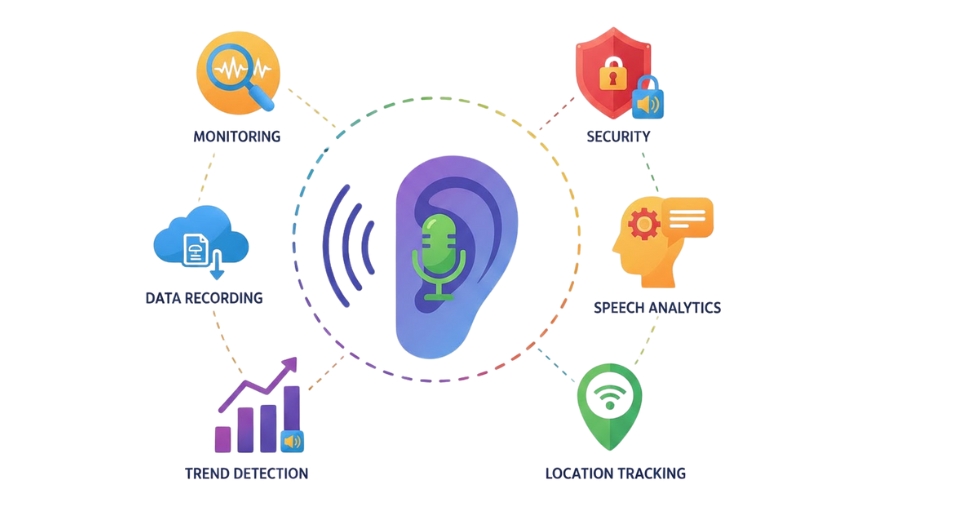
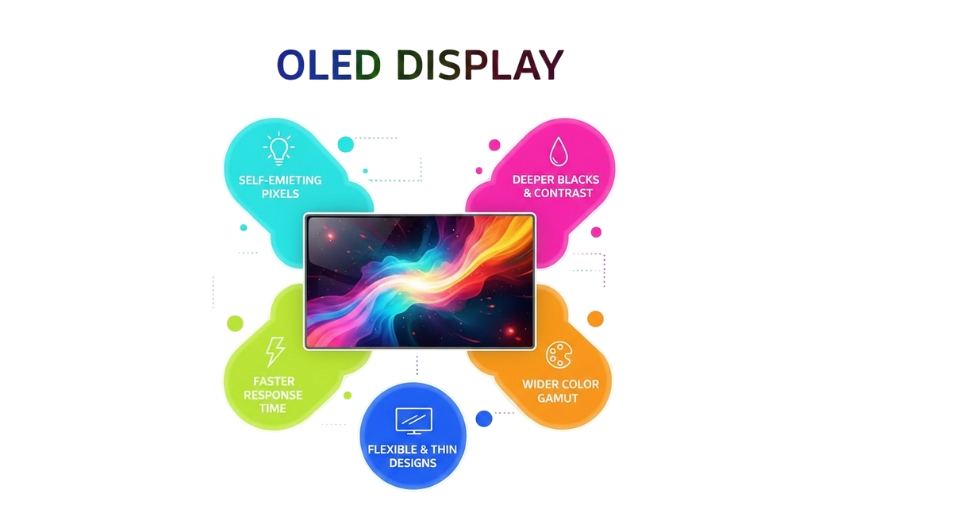
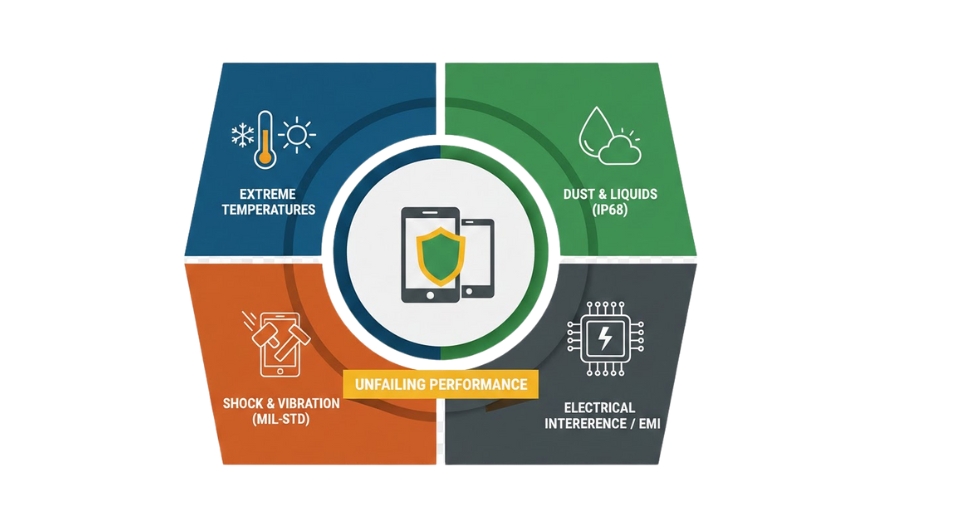


 US: +1 3023308252
US: +1 3023308252






